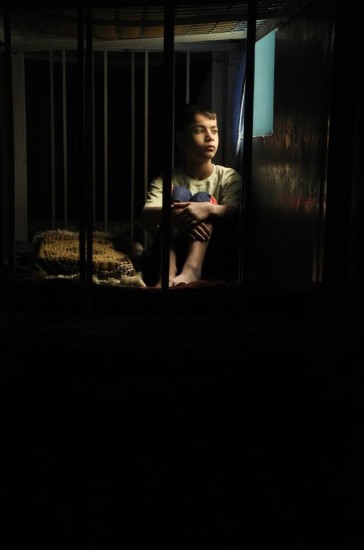
Saif Slaam is one of the orphans facing life back out on the street in the Al-Daradji brothers’ moving IN MY MOTHER’S ARMS
NEW FILMS PRESENTED BY LIVIA BLOOM: IN MY MOTHER’S ARMS (Atia and Mohamed Jabarah Al-Daradji, 2011)
Maysles Cinema
343 Malcolm X Blvd. between 127th & 128th Sts.
October 8-14, $10, 7:30
212-582-6050
www.mayslesinstitute.org
www.facebook.com/InMyMothersArms
 “I’m too young for this pain,” seven-year-old Saif Slaam sings repeatedly in the heartbreaking documentary In My Mother’s Arms. Making its exclusive U.S. theatrical debut October 8-14 at the Maysles Cinema, In My Mother’s Arms follows the story of a makeshift orphanage battling for survival in Baghdad’s dangerous Al-Sadr neighborhood. Largely because of the wars and terrorist activities, there are 800,000 Iraqi orphans in two-dozen state-run facilities that are riddled with abuse. Trying to protect children from those horrors, Husham Al-Dhbe runs a bare-bones two-room orphanage that cares for thirty-two boys, relying on donations from local small businessmen to stay afloat. Stressing the importance of education, Husham is adamant about keeping the kids off the streets, where they can be captured and turned into child soldiers (and suicide bombers) by al-Qaeda. But when the landlord tells Husham that he’s selling the building they’re in and they have to vacate in two weeks, Husham desperately seeks a new home to prevent the children, a mix of Sunni, Shiite, Kurd, and Turkuman, from being sucked into the corrupt state system. The film focuses on three of the most troubled boys: Saif, who is haunted by the terrorist bombing that claimed the life of his mother and plastered his face all over television; ten-year-old Salah Abass, a loner who doesn’t speak or go to school; and the older Mohamed Waael, a diver and musician who regularly taunts Saif. “I won’t give them up,” Husham declares, and he won’t give up on them, either. Sibling filmmakers Atia and Mohamed Jabarah Al-Daradji, who previously collaborated on such documentaries as Ahlaam, Son of Babylon, and Iraq: War, Love, God, & Madness, with Atia directing and Mohamed producing, codirect In My Mother’s Arms, shooting it on film with handheld cameras that give it the look and feel of a fictional narrative, except it’s all too true. The brothers include no talking heads or so-called experts examining the situation and don’t pull at the heartstrings by manipulating emotions, instead telling the story like a mini-thriller as Husham tries every avenue possible to help preserve a better future for the children under his care. Interestingly, the film, produced in association with Al-Jazeera English, has taken some heat for not providing information on how people who see it can help, opening a debate as to the purpose and function of such socially relevant and important documentaries.
“I’m too young for this pain,” seven-year-old Saif Slaam sings repeatedly in the heartbreaking documentary In My Mother’s Arms. Making its exclusive U.S. theatrical debut October 8-14 at the Maysles Cinema, In My Mother’s Arms follows the story of a makeshift orphanage battling for survival in Baghdad’s dangerous Al-Sadr neighborhood. Largely because of the wars and terrorist activities, there are 800,000 Iraqi orphans in two-dozen state-run facilities that are riddled with abuse. Trying to protect children from those horrors, Husham Al-Dhbe runs a bare-bones two-room orphanage that cares for thirty-two boys, relying on donations from local small businessmen to stay afloat. Stressing the importance of education, Husham is adamant about keeping the kids off the streets, where they can be captured and turned into child soldiers (and suicide bombers) by al-Qaeda. But when the landlord tells Husham that he’s selling the building they’re in and they have to vacate in two weeks, Husham desperately seeks a new home to prevent the children, a mix of Sunni, Shiite, Kurd, and Turkuman, from being sucked into the corrupt state system. The film focuses on three of the most troubled boys: Saif, who is haunted by the terrorist bombing that claimed the life of his mother and plastered his face all over television; ten-year-old Salah Abass, a loner who doesn’t speak or go to school; and the older Mohamed Waael, a diver and musician who regularly taunts Saif. “I won’t give them up,” Husham declares, and he won’t give up on them, either. Sibling filmmakers Atia and Mohamed Jabarah Al-Daradji, who previously collaborated on such documentaries as Ahlaam, Son of Babylon, and Iraq: War, Love, God, & Madness, with Atia directing and Mohamed producing, codirect In My Mother’s Arms, shooting it on film with handheld cameras that give it the look and feel of a fictional narrative, except it’s all too true. The brothers include no talking heads or so-called experts examining the situation and don’t pull at the heartstrings by manipulating emotions, instead telling the story like a mini-thriller as Husham tries every avenue possible to help preserve a better future for the children under his care. Interestingly, the film, produced in association with Al-Jazeera English, has taken some heat for not providing information on how people who see it can help, opening a debate as to the purpose and function of such socially relevant and important documentaries.